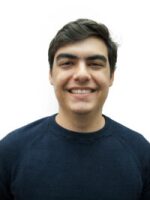The University of Nevada, Reno has been dealing with the aftermath of recent events in Charlottesville, Virginia where one of its students was photographed participating in a white supremacist rally.
The events have sparked broader conversations about diversity on campus -- and vocal criticism of the school's efforts, including the recent appointment of its chief diversity officer.
It was a decision made by university president Marc Johnson, who spoke Thursday with our reporter Jacob Solis.
Jacob Solis of KUNR: First off, I want to talk about Charlottesville. What concrete steps can be taken, if any, to heal the wounds that were opened up last month at UNR?

UNR President Marc Johnson: I think a great deal has already been accomplished. We just happened to have one student who participated in the rally in Charlottesville, and the conclusions that were drawn immediately, when he came back, was that this was a very representative individual, and that we had a great deal of hate speech and white nationalism on our campus, and we have just not found that to be true.
So I think the community used this unfortunate example to really come together as students, as faculty, to show that the values of this campus are for inclusion, and diversity, and supporting everyone rather than dividing everyone.
Switching gears a little bit, these issues also tie into the broader issue of diversity on campus. You recently appointed Patricia Richard to the position of chief diversity officer, and she’s been criticized for not having the right credentials for the job. Multiple faculty members have raised the question of ‘why was the chief diversity officer position filled via appointment, rather than via a national search committee?’ How do you respond?
Certainly. When you say multiple faculty members, that’s two or more I guess, and I have not heard that from very many.
We have to go back a year and a half, when our previous chief diversity officer left, and I appointed Patricia Richard as the interim chief diversity officer. So, as I was looking to fulfill the much broader mission of the regent’s policy toward diversity, with many dimensions, I asked Patricia to try this job on and apply her management skills to engage with, rather than being the voice of, diversity.
When you have this really broad diversity definition, that includes ethnicity, sexual orientation, gender, income, socio-economic class, veterans — just quite a range of definitions — we can’t a chief diversity officer with a responsibility to be the voice of diversity. We needed a manager who could engage with individuals across all those forms of diversity
The university recently implemented new hiring guidelines, among which include guidelines for implicit bias training and having diversity on search committees and these kinds of things. Why didn’t the hiring of the chief diversity officer follow these guidelines?
Well sometimes, it does not work out in a timely way, or to — you don’t always gain so much out of a national search if you know that you have a running program.
I had a year-and-a-half of experience with Patricia Richard as — fulfilling the role. And I’d say she’s done more, and a better job, at engaging with the diverse elements of the campus than any chief diversity officer that I’ve experienced, either at this campus, or at my previous two campuses.
Well thanks so much for talking with us.
Thank you for coming over, and appreciated talking with you.
Jacob Solis is a senior at the Reynolds School of Journalism. He's provided coverage on a variety of perspectives on this issue.




